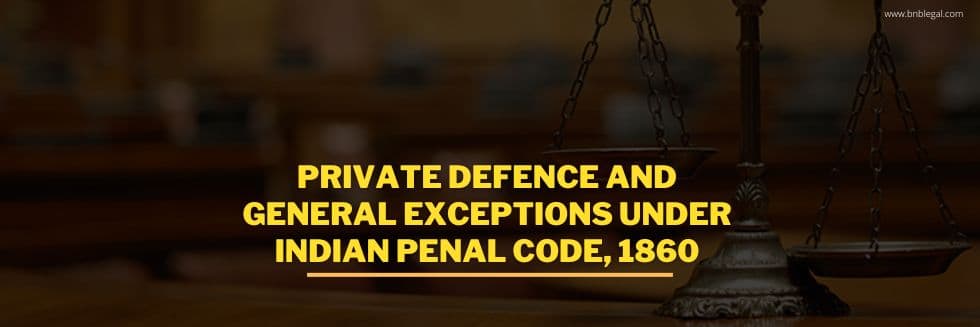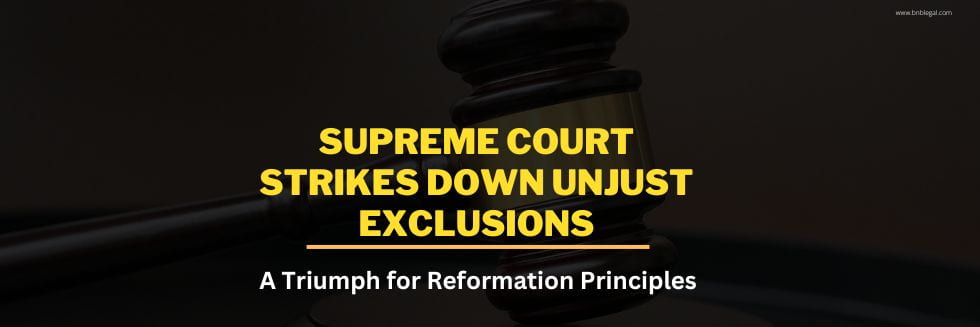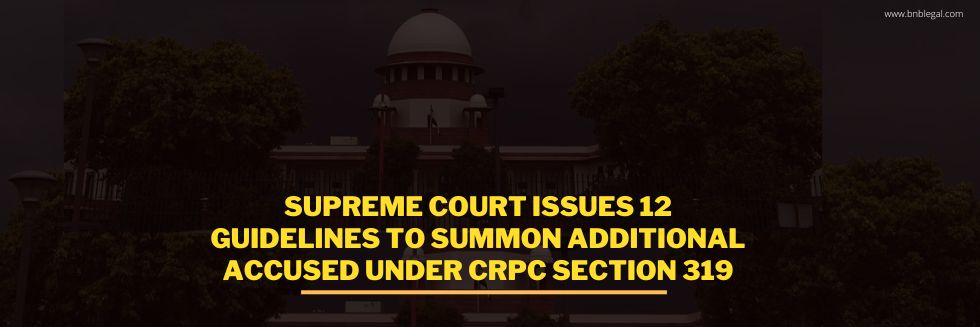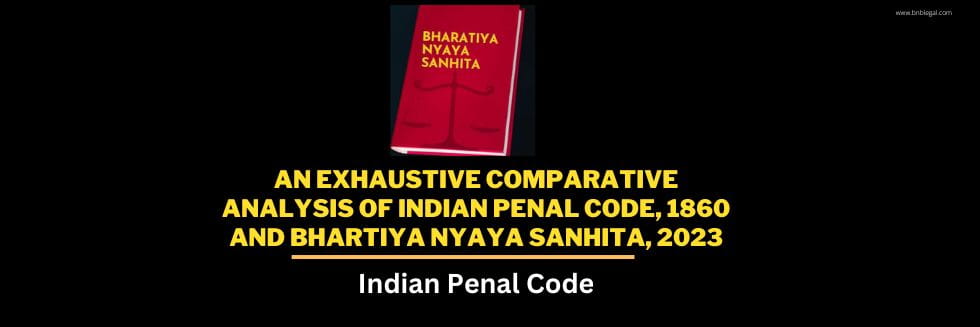Introduction
The Indian Penal Code, 1860 (IPC, 1860) is a very important act that came into existence to provide justice to the victim in case of any heinous, life-threatening crime committed against an individual or group of individuals or against society as a whole. As IPC is criminal in nature, the punishments can range from imprisonment to hefty compensations. Any act that falls under the IPC is not only considered an act against that particular party but also an act against the whole society. Due to this very reason, IPC matters are mostly filed by or against the state. A life threat of any kind, be it murder, suicide, injury, etc., is punishable under the provisions of the IPC.
However, acts of self-defence are an exception to them. Moreover, there are general exceptions under which you can be out of the ambit of the IPC even if a life-threatening act is or was committed by you. A person can escape all the criminal liabilities if he or she, or they, did it for self-defence.
Meaning Of General Exceptions And Private Defence
The general exceptions and self-defence provisions in the IPC deal with the provisions that determine under what circumstances the causing of grievous harm or death to any person is accepted as a defence. The person doing an act to defend himself or herself, their property, or another person’s body or property, needs to take care of the following points:
- The threat or danger should be imminent and immediate in nature, as there should not be any cooling of the period or knowledge of the threat to the person who is acting under Sections 76–106, IPC, 1860.
- If there is no opportunity for the victim to escape or call the authorities for help, then only self-defence is available.
- The use of force should be proportionate to the danger.
What is Grievous hurt?
Grievous hurt is also explained in the IPC under Section 320 of the act. The quoted paragraph under this is as per the provisions of the IPC, 1860. “The following kinds of hurt are designated as grievous :-
(i) Emasculation,
(ii) permanent privation of the sight of either eye,
(iii) permanent privation of the hearing of either ear,
(iv) Privation of any member or joint
(v) destruction or permanent impairing of the powers of any member or joint
(vi) permanent disfiguration of the head or face.
(vii) fracture or dislocation of a bone or tooth
Any hurt which endangers life or which causes the sufferer to be during the space of twenty days in severe bodily pain or unable to follow his ordinary pursuits”.
Interpretation Of The Provisions:
As per the Sections ranging from 76 to 95, IPC, 1860, certain general exceptions are stated, and from Sections ranging from 96 to 106, IPC, 1860, acts of self-defence are stated. Which are as follows:
(A) General Exceptions – Sections 76–95 Of Indian Penal Code, 1860
- The act is done by a person who has legal rights granted by the Honourable Court or by any law to do a certain act that otherwise would have violated the provisions of the IPC. E.g., if a hangman hangs a person till death, no charges can be framed against the hangman for murder, culpable homicide, etc., as he has legal authority to perform that task.
- The act is done by a normal person under certain circumstances and situations that are accepted under law; therefore, there is no legal case against him or her. E.g., if someone shows a knife to you and asks for money, you attack the robber to escape from him or her. Even if the robber is hurt, you would not be under any criminal liability as you attacked to defend, etc.
- If the act is done by a person who has not taken any consent or did not get time to take the consent of the other person, but the act is done either to save the other person or to act for his or her benefit (in good faith), even if the case goes on the opposite track, the person who committed it will escape criminal liability because there was no criminal intention present. E.g., if a doctor performed an operation to save the life of a patient who was grievously stabbed by a knife and was unconscious, even if the patient died while performing the operation, the doctor would not be liable, etc.
- If any criminal offence is committed by a child under the age of seven, he or she is fully exempt from all criminal liabilities, as the presumption and logic behind this section are that a child below the age of seven is not capable of thinking logically and reasonably, hence not having any criminal liability. If the child committed the crime under the direction of any other person, then that person shall be punished as if he or she had done the act himself or herself.
- Any act done by a child above the age of seven but below the age of twelve is also presumed to have been done under his or her inability to think logically and reasonably, but here the difference is that the presumption can be challenged and rebutted. If the child committed the crime under the direction of any other person, that person shall be punished as if he had done the act himself or herself.
- If an act is done by a person who is mentally unsound, if the person at the time of the crime was unsound, the person escapes all criminal liability as it is presumed that he or she was not capable of understanding the nature of the offence at that time. The insanity was either continuous in nature or insane at the time the crime was committed.
- If an act is done under any form of intoxication, then that person also escapes criminal liability, as the presumption is raised that the person at that stage would not be able to think logically and reasonably in order to judge the consequences of an act. However, this defence can only be taken if the person was intoxicated without his or her consent or will. If he or she was intoxicated by their will or consent, this defence cannot be taken. Involuntary intoxication is necessary.
- Any act done without knowing the consequences of the act that will not cause grievous harm or death and with the consent of the person The criminal liability is not on the doer of the act in case of any harm or injury to the person.
- Act done under good faith for the benefit of the person and without any cause to result in the death of the person with the consent of the party For example, if a doctor believes that the patient will recover and receive treatment to cure the disease, the operation has only a 3% chance of causing the patient’s death; the rest, 97%, is fine. Now the hospital asks the patient or his or her family members to sign the liability document before the operation, and the family member signs the document. Now, if the patient unfortunately dies or suffers any harm during the operation, the doctor or hospital will not be liable as the chances of death are very low and the act was done in good faith, with the consent of the party, etc.
- If any act is done for the welfare of a child under the age of twelve without the permission or consent of the guardian, even if the act results in some act punishable as per the IPC, no criminal liability against the person would be framed as the act was done for the goodness or benefit of the child. This is also applicable to insane people. Just that the act does not exceed causing intentional hurt or death.
- Any act done by mistake, accident, or misfortune other than that act does not have any criminal liability attached to it.
- If any act or promise is given under any kind of fear, misconception, misrepresentation of facts, fear of any injury, etc., then such an act will not be subject to any criminal liability even if any person is harmed or injured.
- Communication made in good faith does not have any criminal liability under it, even if it causes harm or death to the person receiving it. E.g., if a doctor informs his or her patient that the disease from which the patient is suffering does not have a cure, if the patient dies after hearing the information due to a heart attack, the doctor would not have any criminal liability even if he had given this information intentionally, etc.
- If an offence is committed by a person under the threat of any harm, or, in simple words, was compelled to do that act under threat, it is not an offence. But if the act was murder, any crime against the state, or any act of violence against the state, then such an act, even if done under threat, is still an offence.
- If an act is done under mistake of fact, not mistake of law, and the person committing it believes that the act was committed by him or her in accordance with law, the person is not subject to any criminal liability. E.g., a police officer is ordered by the court to arrest a culprit; now, the police officer, by mistake, arrests a person who is not the culprit, but the police officer believes him or her to be that culprit based on the testimony of the neighbours residing in the same locality where the arrested person resides, etc.
- Acts causing slight harm or being so trivial in nature that the amount of harm or hurt caused to the person (victim) is very little in nature Such an act is not accepted by the court or is not admitted as it can waste the court’s time. E.g., if a person pinches another person, he or she will not go to court, and the court would also not admit such an act as it is very ordinary in nature.
(B) Private Defence – Sections Ranging From 96 To 106 Of Indian Penal Code, 1860
It gives people the right to exercise their rights of self-defence, and in legal terms, the rights of private defence are available to them in case they are attacked by some other person with violent force in order to cause death or any life threat to that person (the victim). Which are as follows:
- To defend yourself, that is, your body and property. The ambit of this section extends to the bodies and property of other people as well. You can attack to defend yourself or the other person, including their property, in the event of any aggression. e.g., in cases of assault, kidnapping, theft, robbery, etc. However, the force used should be within a reasonable boundary and not be greater than the aggressor’s force. The force used should be to just keep the aggressor out or stop him or her from continuing the attack.
- If a person witnesses any act of violence or aggression that is exercised on some other person in front of his or her eyes, the witness can act with the necessary and reasonable force on the aggressor in order to stop him or her from further violence.
- The act of private defence is also applicable when someone is attacked by an intoxicated or unsound-minded person. The defence is available until the person who is being attacked thinks that he or she is under threat. Although people could argue that people who think reasonably and logically about them also apply this section, here the point of focus is private defence, or in simple words, self-defence. A person could face an attack from any person; that’s why the primary objective is to protect yourself, another person, or property from the attacker.
- The act of private defence has some constraints related to it. These are the reasonable restrictions that prevent the act of private defence from being used wisely by the person. Section 99, IPC, 1860, deals with the reasonable restrictions on private defence expressly:
The act of private defence cannot be applied to a person who is a public servant (police, etc.) and who is doing the act in the lawful discharge of their duties. e.g., if a police officer arrests a person legally with a proper warrant and order, at this time the person being arrested cannot attack the police officer and give an alibi of private defence, etc.
Reasonable force is the key; that is, you cannot use brutal force straight away without any reason that causes death or grievous hurt to the other person. e.g., if a person is attacked by a robber who shows him a knife and asks him to give all the money, then immediately the person who is being attacked shows his gun and the robber starts running away from him. Now, here, the important point is that if the person fires his gun knowing that he is not under any imminent danger, then the injury caused to the robber would be treated as exceeding the reasonable mark for private defence, etc. - The person under private defence can even cause death to another person if the person who is under attack thinks that he or she is under threat. The continuance of threat and danger causes the person to cause harm, grievous hurt, or even death to the other person. E.g., if a person is attacked by a robber and the person under attack shows his gun, but even after showing the gun, the robber is not scared and instead brings out his gun, now the person under attack has the reasonable right to fire a gun to safeguard him. The person at first has to fire an air shot; if the robber runs away, he cannot fire it on the robber, but if the robber, instead of running, targets the person, the next shot could be on his body as well. Section 100, IPC, 1860, deals with it specifically.
- Apart from this, the right to cause harm other than death, like grievous harm or grave injury to another person, is also allowed in order to stop the aggressor.
- The act of private defence for both body and property is continuing as long as the danger prolongs and lasts until the person defending themselves has a reasonable time and opportunity to get the protection of the public authorities like police, etc.
- To safeguard your property as well, the act of private defence gives you the right to cause the aggressor’s death. E.g., offences such as robbery and housebreaking, etc.
- When an act of private defence for the safeguard of property causes grievous hurt or injury other than death, e.g., reasonable apprehension of the commission of offences such as theft, mischief, criminal trespass, etc.
- If an assault is made with the intention to rape, gratify unnatural lust, cause death, or cause grievous hurt, and there is a reasonable apprehension that the person under attack may suffer harm, the person under attack has the right to use force, even causing death if necessary, in order to stop the offence.
Apart from the IPC, the Constitution of India also states and advocates for the Right to Life and Personal Liberty under Article 21 of it, in which it states and holds the right to protect one’s life and bodily integrity; therefore, the act of private defence does hold constitutional validity here.
Relevant Cases Related To Acts Of Private Defence
Landmark judgments in India regarding self-defence under the Indian Penal Code (IPC) are as follows:
- Rattan Singh v. State of Punjab, 1976, Supreme Court of India: here, the Supreme Court of India held that a person who acts in self-defence is entitled to use reasonable force to protect themselves or property only. The use of force should be proportionate to the threat faced, and the person should have a genuine apprehension that it will cause death or grievous harm.
- Shivalingaiah v. State of Karnataka, 2005, Supreme Court: The Supreme Court stated that the person has the right to defend their body and property against an imminent danger. If the threat continues, the person can cause death as well.
- State of U.P. v. Hari Chand, 2009, Supreme Court: In this case, the Supreme Court held that the right of private defence cannot be denied merely on the ground that the danger was not a grave one. The court held that the assessment of the magnitude of the threat should be based on the perception and thinking of the accused at the time of the incident.
- Gaurav Sharma v. State of Rajasthan, 2020, High Court of Rajasthan: The court held that self-defence is a fundamental right and a valid defence against criminal aggression.
- Queen-Empress v. RaghavendraCharlu, 1882: The court held that a doctor performing surgery in good faith to save the life of a patient cannot be held liable for causing death if the patient dies due to an unavoidable accident.
- Mohinder Pal Jolly v. State of Punjab, 1978, Supreme Court: here, workers of a factory threw brickbats at the factory, and in response, the factory owner shot them with his gun. As a result, the worker died. Now, the self-defence alibi was not appreciated by the court, as there was no apprehension of death or grievous harm to the owner of the factory.
- Kamparsare vs. Putappa, Madras High Court: here, a boy in a street was raising a cloud of dust while a passer-by chased the boy and beat the boy. The court held that the passer-by committed no offence and that his act was within one’s exercise of the right of private defence.
- Jassa Singh v. State of Haryana, 2002, Supreme Court: The court held that the right of private defence of property would not extend to causing the death of the person who committed the act, like if the act of trespass was in respect of open land. Therefore, the private defence argument will not be applicable.
In conclusion, acts of private defence hold a very thin line between the lawful and unlawful sides. As they have no exclusive rights and taking it as a form of self-defence is very critical, the reasonable restrictions applied to it help the citizens or general public not to take the law into their hands. These provisions are so well drafted that only in the rarest of rare opportunities when no other scope is left, are you allowed to cause grievous hurt, harm, or death to the other person.
Hence, these provisions are only to defend and not attack, so they should be used very wisely. This is a double-edged sword where either the person can take a decision in his or her favour or they can make the case adverse for themselves from the very beginning itself. Even if someone is abetting or directing a child or insane person to commit a crime on his or her behalf, the actual mind behind the crime will also be punished. Moreover, the mens rea (intention or thinking) of the crime is more important than the actus reus (action or activity).
This article is written and submitted by Ritwick Kundu during his course of internship at B&B Associates LLP. Ritwick is a final-year LL.B. student at Bharati Vidyapeeth, Campus, New Delhi.






